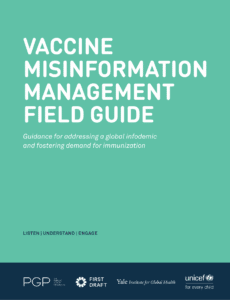Misinformation Alerts
Knowing what misinformation is being shared can help you generate effective messaging.
These insights are based on a combination of automated media monitoring and manual review by public health data analysts. Media data are publicly available data from many sources, such as social media, broadcast television, newspapers and magazines, news websites, online video, blogs, and more. Analysts from the Public Good Projects triangulate this data along with other data from fact checking organizations and investigative sources to provide an accurate, but not exhaustive, list of currently circulating misinformation.
Misinformation Alerts
Knowing what misinformation is being shared can help you generate effective messaging.
These insights are based on a combination of automated media monitoring and manual review by public health data analysts. Media data are publicly available data from many sources, such as social media, broadcast television, newspapers and magazines, news websites, online video, blogs, and more. Analysts from the Public Good Projects triangulate this data along with other data from fact checking organizations and investigative sources to provide an accurate, but not exhaustive, list of currently circulating misinformation.Alerts are categorized as high, medium, and low risk.
- High risk alerts: Narratives with widespread circulation across communities, high engagement, exponential velocity, and a high potential to impact health decisions. Are often more memorable than accurate information.
- Medium risk alerts: Narratives that are circulating in priority populations and pose some threat to health. Potential for further spread due to the tactics used or because of predicted velocity. Often highlights the questions and concerns of people.
- Low risk alerts: Narratives that are limited in reach, don’t impact your community, or lack the qualities necessary for future spread. May indicate information gaps, confusion, or concerns.
A discredited research scientist best known for promoting health-related conspiracy theories recently accused Pfizer of “covering up” a batch of the diphtheria, tetanus, and pertussis (DTaP) vaccines linked to sudden infant death syndrome (SIDS) cases. According to the post, instead of simply recalling the batch, the company deliberately distributed it throughout the country to avoid clusters of injury and death and then recorded the plot in a memo. This claim is related to the recently resurfaced myth that the U.S. Supreme Court declared vaccines “unavoidably unsafe.”
Recommendation: Myths about childhood vaccines and SIDS are widespread, increasing the risk of this misinformation. Debunking messaging may emphasize that anti-vaccine groups have attempted for decades to falsely link childhood vaccines to SIDS despite evidence conclusively showing no link between the condition and any vaccine. SIDS occurs at the same rate in vaccinated and unvaccinated children and has not increased with higher vaccination rates. Vaccines are rigorously monitored for safety, and the batches are recalled immediately when contamination is detected. Fact Checking Source(s): AP News, Health Feedback
An informed consent advocacy group posted a series of images repeating a host of myths about vaccine safety. The post claims that pediatric clinical trials are short, lack controls, and do not include safety training, a previously debunked anti-vaccine argument.
Recommendation: The persistence and widespread nature of this claim elevates its risk. Debunking messaging may emphasize that new vaccines are tested in placebo-controlled clinical trials before they are approved. Updated versions of vaccines may be tested against the previous already safety-tested version rather than a placebo. Denying children access to a safe and effective existing vaccine while testing a new one is an unethical and unnecessary practice. Fact Checking Source(s): STAT News, The Dispatch Science-Based Medicine
A conservative website claims COVID-19 vaccines caused 74 percent of deaths in vaccinated people. The post cites a non-peer-reviewed study that went viral after being pulled from the medical journal The Lancet’s website because its conclusions were unsupported.
Recommendation: The continued circulation of the study as a credible source increases its risk. Debunking messaging may emphasize the low quality of the study and the fact that it was never peer-reviewed or published by a legitimate journal. Messaging may also explain that over three years of research has consistently demonstrated COVID-19 vaccine safety. Fact Checking Source(s): Lead Stories
A video repeats the claim that public health experts discredited ivermectin to ensure that COVID-19 vaccines got emergency authorization.
Recommendation: Vaccine opponents continue to promote disproven COVID-19 treatments as an alternative to vaccination. Messaging may explain that multiple large studies and clinical trials show that ivermectin does not effectively prevent or treat COVID-19. Fact-checking sources:
A prominent vaccine opponent claims that his study analyzing autopsies reports of people who died after COVID-19 vaccination found that vaccines caused 74 percent of the deaths. He further claims that the study was removed from the website of the prestigious medical journal The Lancet less than a day after it was published. The authors and their supporters now claim the “medical establishment” is censoring them.
Recommendation: The widespread nature of this type of misinformation and its potential to negatively influence vaccine conversations even after the studies are discredited increases its risk. Debunking messaging may explain that, contrary to the author's claims, the paper is not a “Lancet study.” It was never published in the journal and has not yet been peer-reviewed. The authors uploaded the study to the Lancet’s preprint database, where it was removed because the journal found that it violated its screening criteria and its conclusions were not supported. Messaging may also emphasize how bad actors use preprint, low-quality, and retracted studies to circulate COVID-19 and vaccine misinformation. Fact-Checking Source(s): 
A low-quality screenshot of an apparent blood clot is being attributed to an embalmer who claims to have observed large clots in the bodies of people who have died from heart attacks or strokes since the COVID-19 vaccine’s rollout.
Recommendation: These types of imaging have circulated online for over two years. Emphasizing that there is no evidence to support these claims is recommended. In over two years since the vaccine roll-out, no peer-reviewed analysis or case reports have found “strange blood clots” in the bodies of vaccinated people. Several of the viral images showing supposed vaccine-related clots were actually pictures taken before 2020 and, in some cases, not blood clots at all. Fact-checking sources:
An advocacy group founded to protest COVID-19 vaccine mandates is shifting its attention to routine vaccines. In a recent post, the group proposes a decades-old anti-vaccine argument that a decrease in infectious diseases was due to improved sanitation and hygiene rather than vaccines.
Recommendation: Anti-vaccine rhetoric targeting routine vaccines may increase vaccine hesitancy, which increases the risk of this alert. Debunking messaging may explain that Improved sanitation standards, hygiene, and nutrition all played a role in reducing mortality and the spread of infectious diseases. But many diseases are not spread through these means, making vaccination the best and most reliable form of protection. Failure to vaccinate against these diseases leaves people unnecessarily vulnerable. Many infections can spread regardless of how clean or healthy people are. If people are not vaccinated against diseases we have managed to control, such as polio and measles, these diseases could quickly reappear. Explaining that, before vaccines, parents could not protect their children from devastating diseases like polio and rubella as they swept through communities is recommended. Fact Checking Source(s): CDC, Boost Oregon, PublicHealth.org
In testimony before the Pennsylvania senate, a tech entrepreneur turned COVID-19 conspiracy theorist repeats the long-disproven myth that Amish children don’t have autism because they are not vaccinated. He also claims that the government is covering up data showing that these communities are healthier because of their low vaccination rate.
Recommendation: High-profile figures continue to promote the persistent myth that childhood vaccines cause autism. Debunking messaging may emphasize that the claim is false on three grounds. First, researchers who have searched for a potential connection between vaccines and autism for decades have never found any evidence linking the two. The original study made the claim was retracted due to its unethical research practices. Second, Amish children do have autism, albeit at lower rates than the general population. One preliminary study found that Amish children are diagnosed with autism at about a third of the national rate, which may be at least partially due to differences in how Amish parents report their children’s behavior. Finally, only around 14 percent of Amish parents refuse vaccinations for their children. That means that the majority of Amish children have received at least some vaccines. Fact Checking Source(s): Snopes, Health Feedback, Very Well Health, CHOP 
News about the death of a Dominican basketball player is trending globally among vaccine skeptics, along with vaccine safety misinformation. The 28-year-old athlete reportedly died of a heart attack during a stress test. Before his death, the basketball player publicly stated that he was diagnosed with myocarditis, which he believed to be related to COVID-19 vaccines.
Recommendation: Vaccine opponents frequently use high-profile deaths to advance anti-vaccine talking points. Social media posts about alleged vaccine-related deaths and injuries often have a large reach and can increase vaccine hesitancy. Prebunking messaging may emphasize that serious adverse reactions to vaccination are extremely rare. At this time, it’s unclear if the athlete’s death was vaccine-related. The death of any person is tragic, and it’s up to health and legal authorities to determine whether an adverse side effect occurred after vaccination. If presented with these narratives, responding with transparency and sympathy towards those who report adverse reactions is recommended, as is emphasizing that COVID-19 has killed millions and that vaccines are the best protection against the disease. Fact Checking Source(s): Newsweek, Reuters, American Heart Association
A trending article claims that “new” emails reveal that CDC and NIH officials were aware of breakthrough COVID-19 infections in early 2021. The article and those sharing it insist that this knowledge makes vaccine requirements unnecessary. A post by a doctor best known for promoting vaccine misinformation claims that the article proves the vaccines didn’t save a “single life.”
Recommendation: Vaccine opponents have used false claims about the effectiveness of COVID-19 vaccines to undermine vaccination efforts since the vaccines’ rollout. The persistence of these claims and their potential to discourage vaccination increases their risk. Debunking messaging may explain that the claims in the article are based on a fundamental misunderstanding of vaccine efficacy. No COVID-19 vaccines had 100 percent efficacy, so some breakthrough cases were expected. This is true of every vaccine. Clinical trial data included breakthrough data, and the CDC began reporting breakthrough infections as soon as vaccines were rolled out. Emphasizing that studies have consistently demonstrated that unvaccinated people are at far higher risk from COVID-19 than vaccinated people is recommended. During the period discussed in the article, nearly all COVID-19 deaths and a large majority of hospitalizations were among unvaccinated people. It is indisputable that vaccines saved millions of lives worldwide. Fact Checking Source(s): CIDRAP, Common Wealth Fund 
Alerts are categorized as high, medium, and low risk.
- High risk alerts: Narratives with widespread circulation across communities, high engagement, exponential velocity, and a high potential to impact health decisions. Are often more memorable than accurate information.
- Medium risk alerts: Narratives that are circulating in priority populations and pose some threat to health. Potential for further spread due to the tactics used or because of predicted velocity. Often highlights the questions and concerns of people.
- Low risk alerts: Narratives that are limited in reach, don’t impact your community, or lack the qualities necessary for future spread. May indicate information gaps, confusion, or concerns.
Vaccine Misinformation Guide
Get practical tips for addressing misinformation in this new guide. Click image to download, or see highlights.



